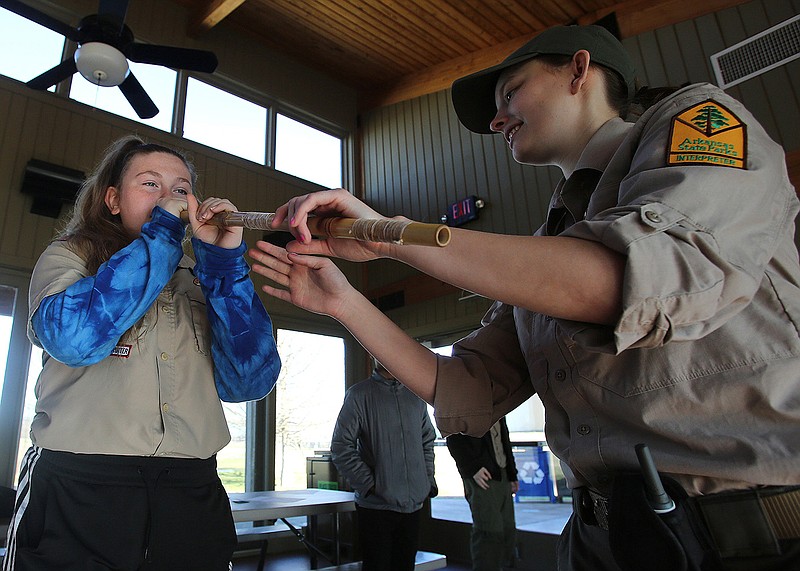Arkansas parks officials want feedback on the name of Toltec Mounds Archaeological State Park, anticipating future efforts to rename the site after a bill to do just that died in the Arkansas Legislature last year.
Individuals will be able to give input on the name at a public meeting scheduled for Wednesday, according to the parks division of the Arkansas Department of Parks, Heritage and Tourism.
The archaeological site near Scott features earthen mounds as well as an embankment that were built by the indigenous inhabitants of the area sometime roughly 1,000 years ago.
"Information will be available at the meeting on the history of the naming of Toltec Mounds Archeological State Park, and State Parks staff will be on hand to answer questions and listen to ideas," according to a news release from the parks division issued on Friday.
The meeting will be held at a Toltec Mounds education pavilion from 3:30 to 6:30 p.m. Wednesday. Officials will also solicit feedback through an online portal for two weeks, from Wednesday through April 27, the release said.
On Monday, Jeff LeMaster, a spokesman for the Department of Parks, Heritage and Tourism, referred to unsuccessful legislation to rename Toltec Mounds when asked what prompted the upcoming meeting.
LeMaster said that "In anticipation that there may be interest in renaming the park in the future, we wanted to be proactive in garnering input from the public and trying to get a good read of what some of the different perspectives were on the current name of the park and whether there are, you know, various ideas about what the park should be renamed, if it were ever to be renamed," LeMaster said.
He said officials want to find out if the issue is important to the public as part of an inclusive approach to any future effort to rename the park.
Officials are referring to the meeting as a "listening session" as opposed to a town-hall-style meeting or public-comment period, LeMaster said.
In the past, the State Parks, Recreation and Travel Commission has led the charge on renaming state parks, according to LeMaster. However, he indicated officials have not heard from the commission on whether they plan to do that in the near future with respect to Toltec Mounds.
The site's current name is an erroneous 19th-century reference to the Toltec civilization of present-day Mexico.
Archaeologists have since attributed the mounds to the so-called Plum Bayou Culture of Native Americans who occupied the site and constructed the earthworks between 650 and 1050 A.D., according to the Encyclopedia of Arkansas.
In an encyclopedia entry on the mounds, Martha Ann Rolingson, who once served as resident archaeologist at the site, calls the Toltec name a "misnomer."
"In the 1800s, people thought that Indians of the eastern United States were not culturally advanced enough to build monumental mounds and earthworks," Rolingson writes. "The Toltecs and Aztecs in Mexico were associated with civilization and the building of monumental earthworks."
Late-1800s landowners gave the name Toltec to a railroad station that was constructed near the mounds, and it came to be applied to the site itself, according to Rolingson.
During the 2021 regular session of the Arkansas Legislature, a bill was introduced by state Rep. Justin Gonzales, R-Okolona, to change the name of Toltec Mounds, but it never got out of a House committee.
House Bill 1823 would have renamed the site "Chief Heckaton Archaeological State Park," a reference to a tribal chief of the Quapaw.
Heckaton, who died in 1842, served as a tribal leader during the period when the Quapaw were dispossessed of their lands in Arkansas, according to the Encyclopedia of Arkansas.
"The Quapaw Nation maintains a historical connection to the State of Arkansas and recognizes it as its ancestral homeland, as evidenced by the numerous burial and historical sites located throughout the region," the text of the bill said.
Gonzales represents House District 19, a southwest Arkansas district in the area of Nashville and Murfreesboro.
When reached via email Monday, Gonzales said he was unaware of the upcoming meeting, but indicated he had discussed the name of Toltec Mounds with Stacy Hurst, secretary of the Department of Parks, Heritage and Tourism.
"It was brought to my attention that the mounds were not built by the Toltec Indians so I thought a name change was appropriate," he wrote. "I spoke with [S]ecretary Hurst during session and she agreed that the name should be changed but asked for time to do research and gather input for an appropriate name."
He did not immediately reply when asked whether a name change could be made unilaterally by Hurst or other department officials without legislative oversight.
Arkansas lawmakers approved legislation in 2021 that placed restrictions on the renaming or removal of certain historical monuments.
Act 1003 of 2021 defines a historical monument as "a statue, memorial, gravestone plate, plaque, or historic flag display" located on public property to honor an individual or a past U.S. military engagement, as well as monuments on public property that have been listed on the National Register of Historic Places and those located in a veterans' cemetery.
It prohibits relocating, vandalizing, damaging, renaming or rededicating historical monuments, with some exceptions.
Toltec Mounds was listed on the National Register of Historic Places in 1973, but the site does not appear to fit the definition of a historical monument as laid out in the legislation.
The act says entities can petition the Arkansas History Commission for a waiver from the requirements.
LeMaster on Monday indicated that he did not think Toltec Mounds would be subject to Act 1003's requirements for monuments and therefore would not have to be referred to the History Commission.
Act 1003's lead sponsor, state Sen. Mark Johnson, R-Little Rock, did not respond to a request for comment via email Monday.
